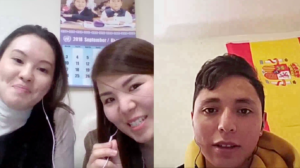
Courtesy Photo
Highlands University biology student DeLeon Rodriguez, right, Skypes with students from Nazarbayev University in Kazakhstan as part of a cultural exchange fall semester 2018.
Las Vegas, New Mexico – New Mexico Highlands University students are increasing their cultural understanding of Kazakhstan in Central Asia, thanks to a Spanish professor’s Fulbright-Hays Scholar Award experience in the country in summer 2018.
Students in Edgar Vargas Blanco’s Intermediate Spanish as a Heritage Language and Advanced Spanish for Health classes at Highlands are engaging in a cultural exchange by communicating via Skype, email and other online modes with students at Nazarbayev University in Astana, the capital of Kazakhstan.
“For the students at Highlands, these opportunities make them view the world with a different lens, broadening their horizons and increasing the tendency to accept others,” said Vargas Blanco, who directs the Language Learning Center at Highlands. “They have an opportunity to better understand other cultures and traditions. Hence, these opportunities act as widows of self-awareness because the students recognize more about their own culture.”
From May 31 – July 1, 2018, Vargas Blanco was among 15 university and high school educators from rural New Mexico and Arizona who traveled to Kazakhstan and Uzbekistan for an intensive learning experience that included curriculum development.
“The opportunity to travel to Central Asia and learn about new cultures and languages while bringing back knowledge for the classroom was an educator’s dream. After I returned, I collaborated with a Nazarbayev University professor, Maria Agrelo Lareo, to organize the cultural exchange for our students. It involved a lot of planning,” Vargas Blanco said.
Highlands sociology professor Erika Derkas co-wrote the Fulbright-Hays grant, which is a partnership with the University of Arizona’s Center of Middle Eastern Studies. It is titled, “Central Asia: Crossroads of Civilization.”
“The goal of this Fulbright is to expand students’ understanding of a very significant and complex part of the world that is understudied, especially in the United States,” Derkas said “The way to do that is to have educators learn more about a region that bridges cultures from ancient to modern times and includes the Far East, Middle East, Europe and Asia.”
Derkas said that Vargas Blanco’s work with his students is an extension of being on the ground in Kazakhstan and Uzbekistan.
“What Edgar observed and learned during the Fulbright is now explored in more depth with his students,” said Derkas, who is incorporating her own Fulbright experience into courses such as Advanced Classical Theory and Introduction to Women’s Studies.
Sixteen of Vargas Blanco’s students from fall semester are participating in the cultural exchange, communicating entirely in Spanish with the university students from the other side of the world.
Mandy Lyon, 40, a senior elementary education major, was both surprised and interested to learn that students in Kazakhstan routinely learn four languages.
“This is impressive to me,” Lyon said. “I think this opens their minds to not just more language, but more cultures. They are fluent in Spanish, for example, making it easy to communicate with them. I was also intrigued by their healthy diets, which include meats, grains and no junk food. One young woman told me she’d never eaten a potato chip.”
DeAngelo Rodriguez, 25, a freshman biology major, observed the way the students think about education.
“Even though the students live in dormitories, they are very mature for their age and seem older than 18 and 20,” Rodriguez said. “They are very focused and serious about their education. It was inspirational to me. It’s interesting how many of them follow in their family’s footsteps professionally, from lawyers to nurses.”
Both Highlands students said the cultural exchange is an enriching and eye-opening glimpse into another way of life across the world.
